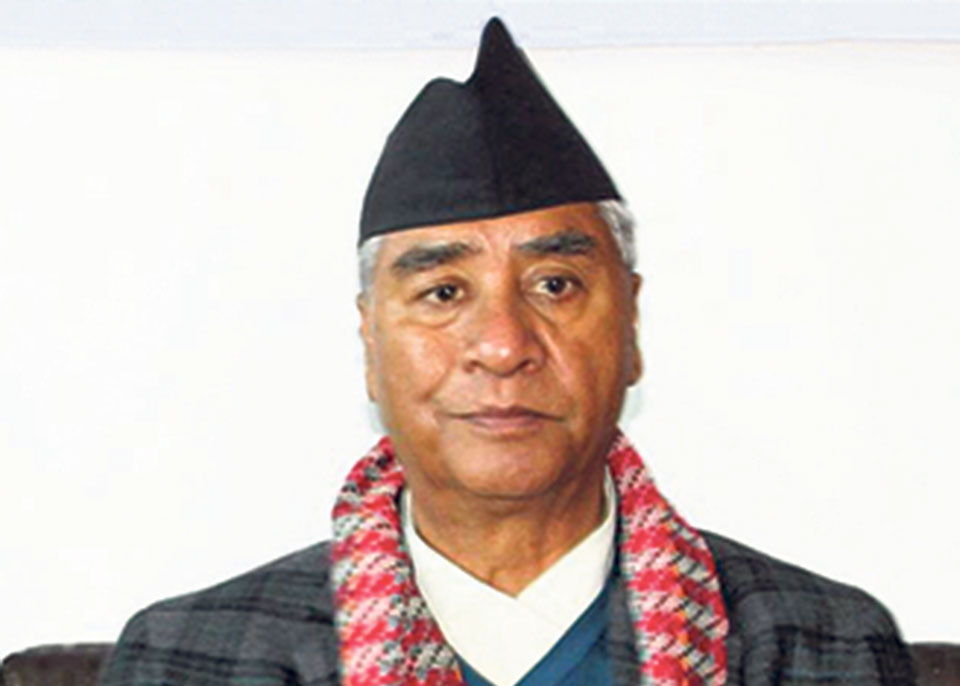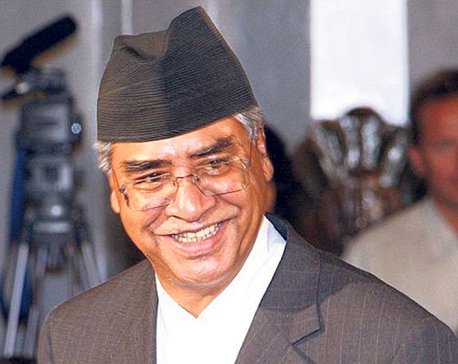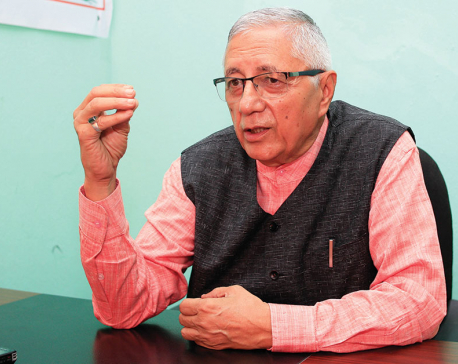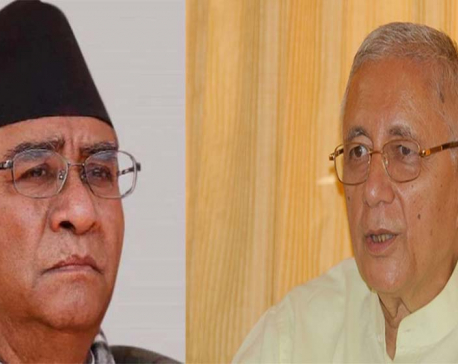
OR
Feeling cornered, Deuba in last ditch attempt at consensus
Published On: March 17, 2019 08:13 AM NPT By: Republica | @RepublicaNepal

Deuba to meet dissident leaders Sunday
KATHMANDU, March 17: The balance of power in the Nepali Congress appears to be shifting with the dissident factions joining hands to form a formidable alliance against party president Sher Bahadur Deuba.
Three years since taking the helm of the grand old party, Deuba for the first time felt challenged in recent weeks after senior leaders including Ram Chandra Paudel, Krishna Sitaula, Shashank Koirala and Prakash Man Singh, all of whom have been seen as possible contenders for party presidency, agreed, in principle, to put aside their differences to work together to save the party.
The new alliance, which was formed after Deuba unilaterally passed the new party statute to expand his power, has not only affected the process of giving full shape to various party committees but also given rise to parallel activities in the party. Party president Deuba and leader Paudel have been separately travelling the country to canvass support of the lower-rung leaders. The dissident leaders have been turning down the establishment faction’s call for a meeting.
On February 26, weeks after endorsing the new statute, Deuba’s attempt to form the regulations drafting committee, discipline committee and general convention election committee had failed after dissident leaders boycotted the meeting. The meeting has been rescheduled for Monday.
Sources said that Deuba is scheduled to meet top leaders including Paudel, Sitaula, Koirala on Sunday to resolve the current crisis.
“The meeting would make a last ditch attempt at consensus on the formation of committees. If that fails, the party would move ahead as per the statute,” said a leader close to Deuba.
He said that the party would take a decision about the next step after consulting the senior leaders.
Deuba was already on the receiving end of the party’s youth, students and women’s wings and an amalgam of more than two-thirds district presidents who have been accusing the president of centralizing power through the revision in the party statute.
The current mess in the party was largely Deuba’s own making. Already under pressure for the party’s stinging defeat in three tiers of elections, Deuba triggered widespread dissatisfaction after the establishment faction pushed through a new party statute despite the Mahasamiti’s calls to curtail president’s powers.
Among other things, the Mahasamiti, which is the apex decision-making body, had recommended the leadership to elect representatives for the general convention through polls during its meeting held in December last year. As per the new statute, the CWC members would act as representatives for the general convention. It is important to note that the establishment faction retains majority in the CWC.
Dissident leaders, who have been boycotting party meetings after the statute was endorsed, have also expressed serious dissatisfaction over the plans to form disciplinary committee and election committee. Fearful that Deuba might use the disciplinary committee to crush his dissidents, the dissenters have been demanding that the committees be formed through consensus.
The prolonged standoff in the party is likely to further cripple the party’s work and push the failing party to chaos and anarchy. Key portfolios and departments of the party’s sister wings still lay vacant, affecting the party’s overall functioning.
NC spokesman Bishwa Prakash Sharma said that the disputes facing the party were natural for a democratic party.
“Efforts for consensus are underway,’’ said Sharma.
You May Like This

Deuba reelected as Nepali Congress President
KATHMANDU, Dec 15: Sher Bahadur Deuba has been reelected as President of Nepali Congress. ... Read More...

Congress leadership lacks moral courage. It should be changed
The main opposition Nepali Congress is a divided house once again. There is war of words between party president Sher... Read More...

Shekhar Koirala’s 12 allegations against Deuba
KATHMANDU, JULY 12: Nepali Congress (NC) leader Dr Shekhar Koirala has made a 12-point allegation against the party’s President Sher... Read More...






Just In
- Challenges Confronting the New Coalition
- NRB introduces cautiously flexible measures to address ongoing slowdown in various economic sectors
- Forced Covid-19 cremations: is it too late for redemption?
- NRB to provide collateral-free loans to foreign employment seekers
- NEB to publish Grade 12 results next week
- Body handover begins; Relatives remain dissatisfied with insurance, compensation amount
- NC defers its plan to join Koshi govt
- NRB to review microfinance loan interest rate











Leave A Comment